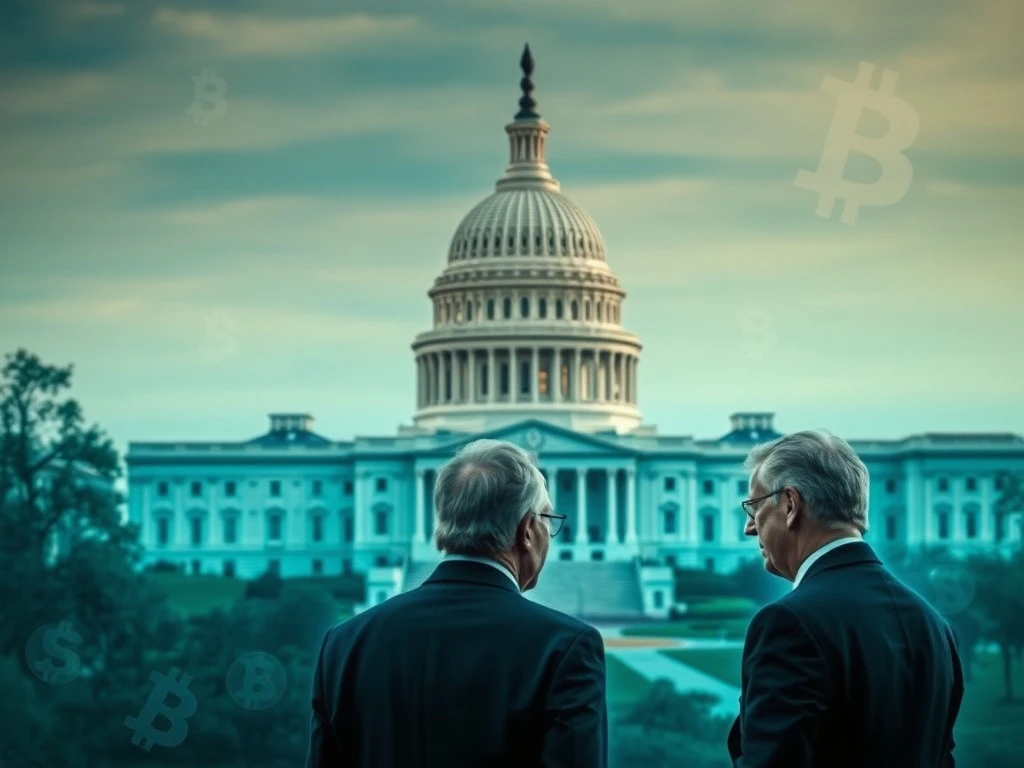US Crypto Regulation Faces Crucial Resistance Over Controversial Foreign Deals

The landscape of US crypto regulation currently faces significant challenges. A pivotal market structure bill, designed to shape the future of digital assets, now confronts unexpected opposition. This resistance stems from serious allegations regarding ‘foreign crypto deals‘ involving prominent White House officials. Consequently, lawmakers express concern that these deals could compromise national security. The unfolding events highlight the complex interplay between cryptocurrency, foreign policy, and domestic legislation, creating a climate of uncertainty for the industry.
Senate Crypto Opposition Mounts
Two influential Democratic senators are signaling strong opposition to a proposed market structure bill. Senators Elizabeth Warren and Elissa Slotkin, members of key committees, have stated they will not support the legislation. Their stance depends on a thorough investigation into two White House officials. This pushback creates hurdles for what many anticipate will be a close vote in the Senate. No scheduled consideration for the bill appeared on Senate calendars as of Wednesday. The lack of a clear path forward underscores the growing political complexities surrounding digital asset governance.
The senators’ concerns specifically target US President Donald Trump’s AI and crypto czar, David Sacks, and his Special Envoy to the Middle East, Steve Witkoff. Warren and Slotkin have formally requested investigations into these individuals. They sent a letter to officials in the US State Department, Commerce Department, and Department of Ethics. The letter emphasizes the need for clarity on whether “politically connected crypto interests are undermining our national security.” Therefore, the senators demand answers before they consider supporting any new digital asset legislation.
Unraveling Controversial Foreign Crypto Deals
The core of the senators’ opposition lies in a New York Times report from September 15. This report detailed a significant $2-billion deal between Abu Dhabi-based investment company MGX and cryptocurrency exchange Binance. Notably, the investment, announced in March, was reportedly settled using the USD1 stablecoin. This stablecoin is issued by World Liberty Financial, a crypto business linked to the Trump family. According to the New York Times, Sacks and Witkoff allegedly facilitated this transaction. They reportedly offered the UAE access to crucial AI chips as part of the arrangement.
The senators sharply criticized these actions. They wrote, “In the history of our country’s foreign policy, one is hard-pressed to find two senior officials with such significant conflicts of interest involved in decisions regarding national security.” They continued, “Such unbridled conflicts of interest have no place in the US government.” Warren and Slotkin urged a swift and thorough evaluation of these serious allegations. Furthermore, they stressed the importance of this information for Congress. It is critical as Congress considers new digital asset legislation and works to prevent crypto corruption from undermining national security.
Impact on Digital Asset Legislation Progress
Senator Warren, the ranking member of the Senate Banking Committee, and Senator Slotkin, a member of the Senate Agriculture Committee, hold crucial votes. Their stance often serves as a bellwether for other Democrats. Therefore, their resistance significantly impacts the prospects of the market structure bill. Last week, a group of 12 Democrats indicated a willingness to collaborate with Republicans on market structure. However, this cooperation hinges on provisions supporting “preventing corruption and abuse.” Warren has previously expressed support for digital asset regulation. Nevertheless, she insists that legislation must not be “written by the crypto industry.”
The path for crypto legislation has been anything but smooth. Initially, a market structure bill in the US House of Representatives faced hurdles. These included Republican concerns over central bank digital currencies (CBDCs). Despite this, the House passed the legislation in July. This included the stablecoin GENIUS bill and the Anti-CBDC Surveillance Act. The House market structure bill, known as the CLARITY Act, received bipartisan support. A significant 78 Democrats voted in favor. However, the legislation encountered similar challenges upon moving to the Senate. This demonstrates the ongoing partisan divides.
The Future of US Crypto Regulation
Wyoming Senator Cynthia Lummis, a banking committee member and a key proponent of the market structure bill, expressed optimism in August. She aimed to have the bill out of committee by the end of that month. However, no scheduled vote appeared on the banking committee’s calendar at the time of publication. A person familiar with the matter indicated that Republicans are actively engaging with Democrats regarding the Senate bill. This legislation is titled the Responsible Financial Innovation Act. They still hope to get the legislation signed into law by 2026. This timeline suggests a prolonged legislative battle.
The White House has not yet provided comment on these developments. This silence adds another layer of complexity to the ongoing discussions. The unfolding situation underscores the intricate relationship between political influence, national security, and the rapidly evolving cryptocurrency industry. The outcome of these investigations and the subsequent votes will profoundly shape the future of US crypto regulation. Furthermore, it will set a precedent for how the nation handles emerging financial technologies and their global implications. Stakeholders across the crypto ecosystem are watching these developments closely, understanding their significant ramifications.





